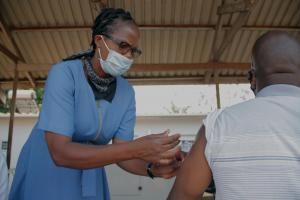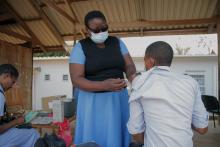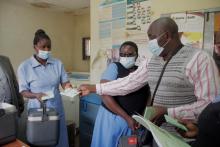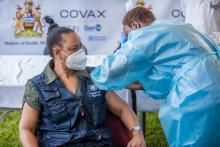Malawi marks one year of COVID-19 vaccination, 828, 080 people receive full dose
Lilongwe, 11 March 2022—One year ago today, Malawi launched a COVID-19 vaccination campaign with vaccine doses it received from the COVAX Facility.
To date, 1,955,495 million doses of COVID-19 vaccine have been administered and an estimated 4.4% of the total population has been fully vaccinated. Efforts are underway to increase vaccine uptake to reach a wider proportion of the population.
Since the first shipments, the country has now received a total of 4,469,720 million COVID-19 vaccine doses; 55% (2,459,820 doses) of these from COVAX, 16% (706,800 doses) from the African Vaccine Acquisition Trust (AVATT), and 29% (1,303,100 doses) from bilateral deals and donations. Starting with one vaccine type – Astrazeneca – Malawi is now offering COVID-19 vaccination with three vaccines – Astrazeneca, Janssen, and Pfizer
Malawi rolled out the COVID-19 vaccine in a phased approach, starting with health care workers and other priority groups which included, immigration officers, National Defense Forces, prison warders, prisoners, teachers, those 60 years old and above, and people with underlying health conditions. However, the vaccine roll-out was challenged at several levels, resulting in low uptake.
According to World Health Organization social listening survey, there was vaccine hesitancy due to misinformation, disinformation, and lack of general knowledge about the COVID-19 vaccines. Malawi also faced vaccine supply chain challenges, including a delay in vaccine supply, which resulted in COVID-19 vaccine stockout at the peak of the third wave - this setback was a missed opportunity to increase the number of vaccinated population. Malawi also experienced health system pressures to deliver multiple vaccine types, some with very short shelf-lives, while ensuring that health workers were trained on each vaccine specificities, and that vaccines were delivered within their lifetime
“Despite the challenges, the Ministry of Health with support from partners such as GAVI, UNICEF, the World Bank and WHO, has made great efforts to increase the vaccine uptake through expanding vaccination sites, ensuring effective use of available stocks, pacing delivery of new vaccine stocks, mobilizing communities and addressing doubts and misinformation, training health workers, and providing additional support for low-performing districts to increase vaccine uptake” said Dr Janet Kayita, Acting WHO Representative in Malawi. “WHO congratulates Malawi on this important milestone, and will continue to support the government and its partners to achieve its goals.”
In Oct. 2021, a joint Ministry of Health (MoH) and WHO-led partner multi-agency mission comprising of WHO, UNICEF, JSI and Gavi examined the root causes for the slow COVID-19 vaccine uptake in Malawi and recommended strategies – both supply and demand-side - to scale up the uptake.
To increase vaccine demand, the country has deployed different vaccine delivery strategies. Besides having fixed vaccination sites, the country has also adopted periodic mobile, outreach and door to door vaccination campaigns.
In November, 2021, Malawi government with support from UNICEF and technical support from WHO, launched a COVID-19 Vaccine Express Program to reach all parts of the country including the remotest of the rural locations where community settlements are high. Following the vaccine express program, the country registered an increase in uptake of vaccines by 61%.
In a sub-set of low-performing districts with a high burden of COVID-19, WHO with UNICEF and health partners are supporting the Ministry of Health to enhance support supervision and enhance demand for the COVID-19 vaccine. Through WHO technical and financial support, the Ministry of Health conducts community engagement initiatives that target village health committees, traditional and religious leaders. The aim of the engagements is to orient the key community influencers on COVID-19 vaccine messages that highlight health benefits of the vaccine. The orientation also aims at addressing misinformation, myths and misconceptions surrounding the COVID-19 vaccines.
WHO continues to support the country to scale up COVID-19 vaccine uptake, which will protect against severe forms of disease, hospitalization and the emergence of variants. WHO is also support efforts to step up surveillance, genome sequencing capacity, and increase testing to facilitate early detection and response to clusters of cases. Support for efforts to adhere to public health and social measures is also continuing



